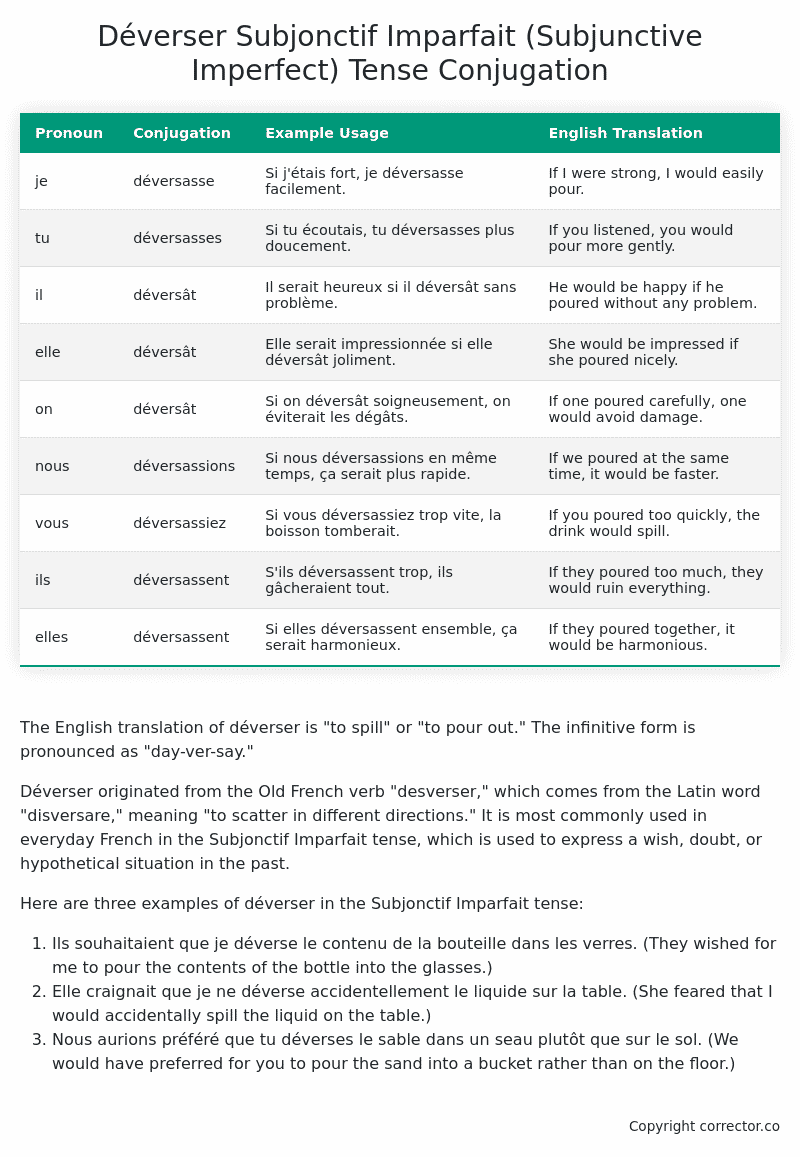Subjonctif Imparfait (Subjunctive Imperfect) Tense Conjugation of the French Verb déverser
Introduction to the verb déverser
The English translation of déverser is “to spill” or “to pour out.” The infinitive form is pronounced as “day-ver-say.”
Déverser originated from the Old French verb “desverser,” which comes from the Latin word “disversare,” meaning “to scatter in different directions.” It is most commonly used in everyday French in the Subjonctif Imparfait tense, which is used to express a wish, doubt, or hypothetical situation in the past.
Here are three examples of déverser in the Subjonctif Imparfait tense:
- Ils souhaitaient que je déverse le contenu de la bouteille dans les verres. (They wished for me to pour the contents of the bottle into the glasses.)
- Elle craignait que je ne déverse accidentellement le liquide sur la table. (She feared that I would accidentally spill the liquid on the table.)
- Nous aurions préféré que tu déverses le sable dans un seau plutôt que sur le sol. (We would have preferred for you to pour the sand into a bucket rather than on the floor.)
Table of the Subjonctif Imparfait (Subjunctive Imperfect) Tense Conjugation of déverser
| Pronoun | Conjugation | Example Usage | English Translation |
|---|---|---|---|
| je | déversasse | Si j’étais fort, je déversasse facilement. | If I were strong, I would easily pour. |
| tu | déversasses | Si tu écoutais, tu déversasses plus doucement. | If you listened, you would pour more gently. |
| il | déversât | Il serait heureux si il déversât sans problème. | He would be happy if he poured without any problem. |
| elle | déversât | Elle serait impressionnée si elle déversât joliment. | She would be impressed if she poured nicely. |
| on | déversât | Si on déversât soigneusement, on éviterait les dégâts. | If one poured carefully, one would avoid damage. |
| nous | déversassions | Si nous déversassions en même temps, ça serait plus rapide. | If we poured at the same time, it would be faster. |
| vous | déversassiez | Si vous déversassiez trop vite, la boisson tomberait. | If you poured too quickly, the drink would spill. |
| ils | déversassent | S’ils déversassent trop, ils gâcheraient tout. | If they poured too much, they would ruin everything. |
| elles | déversassent | Si elles déversassent ensemble, ça serait harmonieux. | If they poured together, it would be harmonious. |
Other Conjugations for Déverser.
Le Present (Present Tense) Conjugation of the French Verb déverser
Imparfait (Imperfect) Tense Conjugation of the French Verb déverser
Passé Simple (Simple Past) Tense Conjugation of the French Verb déverser
Passé Composé (Present Perfect) Tense Conjugation of the French Verb déverser
Futur Simple (Simple Future) Tense Conjugation of the French Verb déverser
Futur Proche (Near Future) Tense Conjugation of the French Verb déverser
Plus-que-parfait (Pluperfect) Tense Conjugation of the French Verb déverser
Passé Antérieur (Past Anterior) Tense Conjugation of the French Verb déverser
Futur Antérieur (Future Anterior) Tense Conjugation of the French Verb déverser
Subjonctif Présent (Subjunctive Present) Tense Conjugation of the French Verb déverser
Subjonctif Passé (Subjunctive Past) Tense Conjugation of the French Verb déverser
Subjonctif Imparfait (Subjunctive Imperfect) Tense Conjugation of the French Verb déverser (this article)
Subjonctif Plus-que-parfait (Subjunctive Pluperfect) Tense Conjugation of the French Verb déverser
Conditionnel Présent (Conditional Present) Tense Conjugation of the French Verb déverser
Conditionnel Passé (Conditional Past) Tense Conjugation of the French Verb déverser
L’impératif Présent (Imperative Present) Tense Conjugation of the French Verb déverser
L’infinitif Présent (Infinitive Present) Tense Conjugation of the French Verb déverser
Struggling with French verbs or the language in general? Why not use our free French Grammar Checker – no registration required!
Get a FREE Download Study Sheet of this Conjugation 🔥
Simply right click the image below, click “save image” and get your free reference for the déverser Subjonctif Imparfait tense conjugation!

Déverser – About the French Subjonctif Imparfait (Subjunctive Imperfect) Tense
Formation
Common Everyday Usage Patterns
Interactions with Other Tenses
Subjonctif Présent
Indicatif Passé Composé
Conditional
Conditional Perfect
Summary
I hope you enjoyed this article on the verb déverser. Still in a learning mood? Check out another TOTALLY random French verb conjugation!


